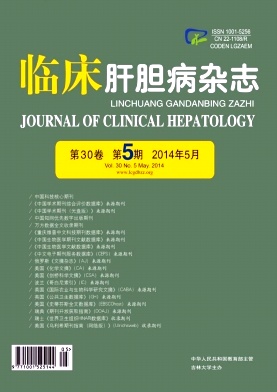|
[1]JUBLANC C, BEAUDEUX JL, AUBART F, et al.Serum levels of adhesion molecules ICAM-1 and VCAM-1 and tissue inhibitor of metalloproteinases, TIMP-1 are elevated in patients with autoimmune thyroid disorders:relevance to vascular inflammation[J].Nutr Metab Cardiovasc Dis, 2011, 21 (10) :817-822.
|
|
[2]JAIN A, SAXENA S, KHANNA VK.Status of serum VEGF and ICAM-1 and its association with external limiting membrane and inner segment-outer segment junction disruption in type 2 diabetes mellitus[J].Mol Vis, 2013, 4 (19) :1760-1768.
|
|
[3]EFE C, WAHLIN S, OZASLAN E, et al.Autoimmune hepatitis/primary biliary cirrhosis overlap syndrome and associated extrahepatic autoimmune diseases[J].Eur J Gastroenterol Hepatol, 2012, 24 (5) :531-534.
|
|
[4]NISHIO A, KEEFFE EB, GERSHWIN ME.Immunopathogenesis of primary biliary cirrhosis[J].Semin Liver Dis, 2002, 22 (3) :291-302.
|
|
[5]YANG LL, BAO QD, CUI DL, et al.Expression of NF-κB and its regulation products in experimental autoimmune hepatitis and its significance[J].World Chin J Dig, 2008, 16 (8) :892-895. (in Chinese) 杨兰兰, 鲍启德, 崔东来, 等.核因子-κB及其调控产物在实验性自身免疫性肝炎中的表达及意义[J].世界华人消化杂志, 2008, 16 (8) :892-895.
|
|
[6]OZASLAN E, EFE C, HEURGU-B, ERLOT A, et al.Factors associated with response to therapy and outcome of patients with primary biliary cirrhosis with features of autoimmune hepatitis[J].Clin Gastroenterol Hepatol, 2013, Sep 26.[Epub ahead of print]
|
|
[7]ODZE RD, GOLDBLUM JR.Surgical pathology of the G I tract, liver, biliary tract and pancreas[M].Philadelphia, PA:Saunders Elesvier, 2009:1035-1043.
|
|
[8]HLINDOR KDH, HGERSHWIN MEH, HPOUPON RH, et al.Primary biliary cirrhosis[J].Hepatology, 2009, 50 (1) :291-308.
|
|
[9]HMANNS MPH, HCZAJA AJH, HGORHAM JDH, et al.Diagnosis and management of autoimmune hepatitis[J].Hepatology, 2010, 51 (6) :2193-2213.
|
|
[10]KANA I, TAKESHI K, HIROYUKI I, et al.Induction of ICAM-1 and VCAM-1 on the mouse lingual lymphatic endothelium with TNF-α[J].Acta Histochem Cytochem, 2008, 41 (5) :115-120.
|
|
[11]BLAND K, LAPIERRE P, DJILALI-SAIAH I, et al.Liver restores immune homeostasis after local inflammation despite the presence of autoreactive T cells[J].PLoS One, 2012, 7 (10) :e48192.
|
|
[12]ABDALLA A, SHEESHA AA, SHOKEIR M, et al.Serum intercellular adhesion molecule-I in children with chronic liver disease:relationship to disease activity[J].Dig Dis Sci, 2002, 47 (6) :1206-1208.
|
|
[13]TORTORELLA C, SACCO R, ORLANDO P, et al.sICAM-1, sCD95 and sCD95L levels in chronic liver diseases of different etiology[J].Immunopharmacol lmmunotoxicol, 2000, 22 (1) :19-33.
|
|
[14]SIMPSON KJ, JONES AL, FORBES HA, et al.Soluble adhesion molecules and interleukin-2 receptor concentrations in patients with autoimmune chronic hepatitis[J].Eur J Gastroenterol Hepatol, 1995, 7 (5) :455-460.
|
|
[15]BUMGARDNER GL, LI J, APTE S.Effect of tumor necrosis factor alpha and intercellular adhesion molecule-1 expression on immunogenicity of murine liver cells in mice[J].Hepatology, 1998, 28 (2) :466-474.
|
|
[16]THOMSON AW, SATOH S, NUSSLER AK, et al.Circulating intercellular adhesion molecule-1 (ICAM-1) in autoimmune liver disease and evidence for the production of ICAM-1 by cytokinestimulated human hepatocytes[J].Clin Exp Immunol, 1994, 95 (1) :83-90.
|
|
[17]BRUNO CM, SCIACCA C, CILIO D, et al.Circulating adhesion molecules in patients with virus-related chronic diseases of the liver[J].World J Gastroenterol, 2005, 11 (29) :4566-4569.
|
|
[18]HYOKOMORIH HH, HHODAH HMH, HOGIH HMH, et al.Expression of adhesion molecules on mature cholangiocytes in canal of Hering and bile ductules in wedge biopsy samples of primary biliary cirrhosis[J].World J Gastroenterol, 2005, 11 (28) :4382-4389.
|
|
[19]CZAJAH AJ.Autoimmune liver diseaseH[J].Curr Opin Gastroenterol, 2000, 16 (3) :262-270.
|
|
[20]WANG TL, ZHAO XY.Pathological features of autoimmune hepatitis[J].J Clin Hepatol, 2011, 27 (6) :577-580. (in Chinese) 王泰龄, 赵新颜.自身免疫性肝炎的病理特点[J].临床肝胆病杂志, 2011, 27 (6) :577-580.
|









 本站查看
本站查看




 DownLoad:
DownLoad: